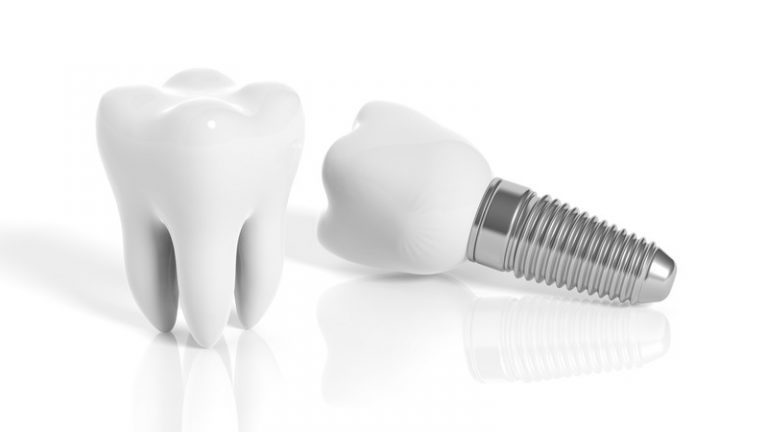Dental implants are clearly your best option for tooth replacement — though they are also one of the most expensive. You’re paying for the skill and time it takes to install dental implants correctly, but you’re also not paying to replace dentures or bridges every few years. Dental implants are a considerable investment, after all. But how long does a dental implant last? It is really worth it in the end?
Dental Implants are Meant to Be Permanent.
While you may need the crown changed after 15 or 20 years, your jaw has fused to the implant, so it’s not supposed to go anywhere. But, like just about everything else in life, the permanency of your dental implants depends on a number of factors, mainly your lifestyle choices and overall dental hygiene.
After all, dental implants are an holistic replacement for your teeth, so they actually function much the way your teeth did. If your tooth loss was due to decay because of smoking, alcohol, sugar, etc., your dental implants will fail if you continue those habits. So make sure you take good care of your new teeth.
The good news is the science of dental implants has advanced to the point that failures due to rejection or functionality issues are now very rare. By far, the most common reasons for a dental implant failing include issues with the patient’s body ad don’t originate from the dental implant:
- Misuse of the implant
- Pre-existing medical conditions like diabetes or COPD
- Disease
- Poor dental hygiene
- Unhealthy lifestyle
- Tobacco and/or drug use
But most dental implants last a long time, providing you take care of yourself and your new tooth. And the great thing is, they require no special care; you take care of a dental implant the same way as the rest of your teeth: daily brushing, flossing and mouthwash.
What is a Dental Implant Made Of?
Dental implants are designed to last a long time. They are made of solid materials. The implant itself is either a titanium or zirconia post that is surgically embedded into the jawbone of a patient. The patient’s jaw grows around and fuses to the dental implant, and serves as a root for the crown. The abutment is what’s fastened to the implant. It holds the crown in place. The crown is a ceramic false tooth fixed atop the abutment. The crown looks and functions like a natural tooth. And since the dental implant itself replaced the missing tooth root, it protects the alignment of the other teeth and the health of the jawbone.
There are a few differences between titanium and zirconia implants. While titanium is very biocompatible, people with metal allergies may have sensitivities, or a person may just not want metal permanently embedded in their jaw.
Zirconia dental implants are technically a ceramic. That means no chance of rejection and a truly natural, holistic way to replace teeth. However, zirconia implants are more at risk for breaking, and they have to be a bigger gauge to get the same stability you would with a titanium implant.
How Long Do Dental Implants Last?
Here’s the thing: You take care of your dental implant, and the implant screw will last a lifetime. But you’ve got to take care of your oral health. That means making that dental checkup and cleaning every six months, keeping good dental hygiene, and not abusing your teeth with acidic or sugary foods.
The crown, on the other hand, may last only 10 to 15 years before it needs to be replaced due to wear and tear. But if you take excellent care of your teeth, you may indeed get the crown to last a lifetime. The answer is up to you.
Dental implants truly replace your teeth, so the better you care for your whole mouth health, the longer your implant crown will last, and the better you can ensure that implant root never goes anywhere either.
Why Dental Implants Can Wear out Overtime
There are two main factors that lead to dental implant failure: peri-implantitis and failed osseointegration. These failures tend to occur within the first few years or even within 6 months of your oral surgery.
- Peri-implantitis is a gum disease that attacks your implants with an infection that damages the bone around the tooth. The condition can result in a loose tooth. Treating this malady will likely include dental bone grafting to repair the bone damage.
- Failed osseointegration happens when the bone grows around the implant, essentially making it too secure so it doesn’t have the flexibility to breathe. This is a problem related to bone quality. It can be common in people who smoke, or if your mouth has had any bone grafting. On the other hand, failed osseointegration can mean that the dental implant failed to take – the jaw wouldn’t integrate with the implant root because of some health factor or other complication.
As we mentioned, lifestyle and dental care can also impact how long your dental implants will last. We use highly advanced technology so failure rarely occurs due to rejection or functionality. But other factors such as pre-existing medical conditions, misuse of your implants, and disease can affect how long your implants will last. Even something as simple as whether you clench your jaw a lot or grind your teeth at night can affect the health of your dental implants (and your other teeth, too).
If you smoke, have diabetes or other medical conditions such as cancer, you may have a higher rate of failure. You’ll also need to have a healthy jawbone, because the implants are supposed to fuse with your jawbone. Cheekbone implants can be done in rare situations, but tend to have a higher failure rate.
If you don’t have enough jaw bone, we can do dental bone regeneration beforehand. This is a process of grafting bone material onto the jawbone to strengthen it. The bone will take a few months to integrate with your original jawbone, so there is some healing time required. However, it greatly increases the chances of long-term success with your dental implants.
How to Avoid Dental Implant Failure
Want to avoid dental implant failure so they last a long time? The key is to have regular appointments with your dentist every 6 months so they can check your progress. Cleanings are also important because it prevents excess buildup around the dental implant. They’re just like your natural teeth, so taking care of them just the same way you should your natural teeth will keep them in great condition for decades to come.
Considering Dental Implants?
If you are thinking about dental implants, you could see your regular dentist, but it may be worth getting a specialist with advanced knowledge in oral surgery. They can help circumvent any potential problems to ensure you get a beautiful dental implant that lasts a long time.
What’s more, some oral surgery practices (like ours!) specialize in affordable implants, and also offer same-day dental implants to patients who qualify. Seeing an oral surgeon for procedures like implant surgery is the best way to ensure you know exactly what to expect and what to do to make the most of your fully-restored smile.










